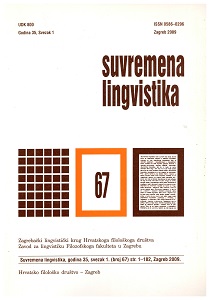Izvanjske indeksikalne osobine govornika varaždinskoga i osječkoga govora
Extrinsic indexical characteristics of Vara‘din and Osijek dialect speakers
Author(s): Gordana Varošanec-Škarić, Gabrijela KišičekSubject(s): Language and Literature Studies
Published by: Hrvatsko filološko društvo
Keywords: sociophonetic research; indexical data; urban speakers; Croatian language
Summary/Abstract: The aim of the study was to find out which stereotypical extrinsic indexical characteristics are ascribed to the speakers from two Croatian cities: Vara‘din (Kajkavian origin) and Osijek (Shtokavian origin). The question was whether negative indexical characteristics depend on the geographical region or are they simply referred to as regional speech, as well as how much of this regional accent is tolerated among the listeners. Altogether there were 40 subjects, same number of male and female subjects, 20 from each town. According to 40 randomly played 20–second samples of spontaneous speech, 28 listeners tried to make an evaluation of social and psychological indexical characteristic on the linear seven–degree scale. The final T–test results for all listeners haven’t shown any difference in evaluation of Vara‘din and Osijek speakers’ regional quality. On the other hand, listeners of Kajkavian origin from Northwest Croatia rated all speakers significantly less regional than the listeners of Shtokavian origin from East Croatia did. However, the latter rated speakers from Osijek significantly better (p<0.0001), which is a sign of greater certainty due to the fact Croatian standard pronunciation is based on Shtokavian dialect. Procedure VARIMAX rotation of main components showed four factors: speech acceptability vs. unacceptability, psychological acceptability vs. unacceptability, liberal vs. conservative and likeable vs. not likeable. The factor of speech acceptability is highly significantly correlated with occupation (r = 0.957, p<0.0001), intelligence, education, higher social status, speech acceptability in public use and interest for becoming friendly with the speaker. It is in middle positive correlation with the evaluation of character and degree being liberal and in middle significant negative correlation with inferiority, degree of being conservative and being meek. Psychological acceptability factor is in high significant correlation with inferior, meek and underestimating character, and in middle negative correlation with occupation, education, speech acceptability in public use and higher social status. Psychological acceptability factor is in high significant correlation with inferior, meek and underestimating character, and in middle negative correlation with occupation, education, speech acceptability in public use and higher social status. The results have shown that speaker’s indexical information based on their city speech are notable and important to evaluators. It is interesting that there were no statistically significant differences concerning the regional determination of cities in factors of speech acceptability, psychological social empathy, liberality, conservativeness and likeability.
Journal: Suvremena lingvistika
- Issue Year: 35/2009
- Issue No: 67
- Page Range: 109-124
- Page Count: 16
- Language: Croatian

